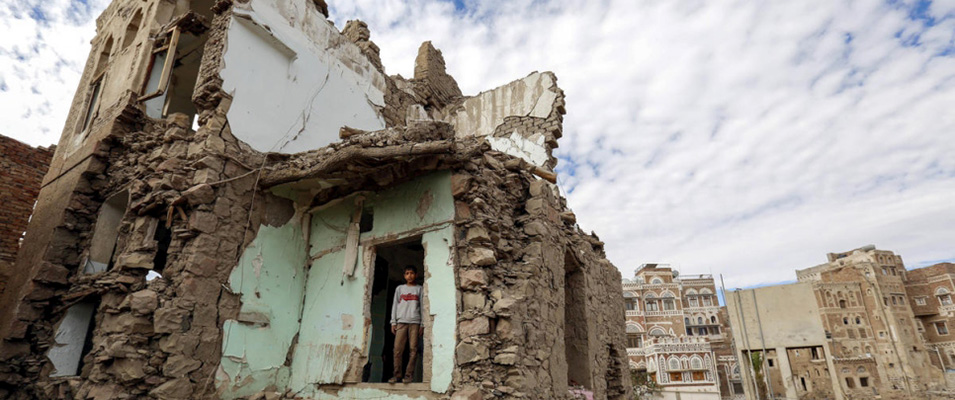
(UNHRC via Mohammed Hamoud)
By Sumana Ali
After the backlash of US involvement in the Saudi-led war in Yemen, Congress passed a bipartisan resolution to end support for Saudi Arabia. President Trump used his presidential power to veto a resolution passed by Congress to end U.S. military assistance in Saudi Arabia’s war in Yemen.
The Trump administration is not only continuing its support for the Saudi-led proxy war in Yemen but also continuing to disregard the Yemeni refugees who are trying to flee the violent war and come live with their families in the U.S. The Muslim ban on Yemen and other Muslim majority countries still continues to separate families. Currently, many Yemeni Americans have no idea when they will see their loved ones because immigration has been halted.
Aisha Yusuf, a 23-year-old resident of the Bronx, has been married to her husband for almost two years. She hasn’t seen him for a year because of the armed conflict in the area of her husband’s hometown. Yusuf used to travel to see her husband and family in Yemen but since the travel ban, she’s afraid she might not be let back in the U.S. because she’s just a permanent resident. Her husband’s case is still pending and she suspects it is because of the permanent resident status but hopes that her husband can move another country soon.
The U.S. Embassy in Sana’a also closed due to the rise of violence. Yemenis who want to come to the United States have to travel to neighboring countries’ embassies to apply. Currently, with the Muslim ban in place, Yemeni Americans can’t apply for their direct family members like spouses and children to come to the U.S. unless they apply for a waiver. However, there is no such thing as a waiver application or form or an official website. Dalia Shamas, a human rights attorney for the Center for Constitutional Rights, said there is no formal application process for refugees from Yemen even those with a valid immigration case.
In 2015, Yusuf took refuge in Djibouti, a small country on the Horn of Africa, when the conflict in Yemen worsened in her hometown. There she recalls suffering from inhumane conditions. A large number of Yemenis fled to Djibouti and government officials often treated the Yemeni refugees badly in hopes that they would return home. “People fled Yemen to go to countries like Djibouti, but there wasn’t sympathy,” said Yusf. “We were treated like animals because they didn’t want us. Neither did other neighboring countries.”
Saudi airstrikes have made normal lives practically impossible in Yemen. There have been 20,000 airstrikes in Yemen since the conflict escalated in March 2015. There isn’t any escape for the refugees who were displaced during the last few years or the people who live without their loved ones like Yusuf’s husband.
Basher Alomari, a Queens resident and business owner, has family members living in Yemen. He had to leave his young children for nearly eight months to bring his 71-year-old mother from Yemen last year after she had fled to Djibouti. Alomari was able to do this for his mother because he is financial stable. He was able to cover the costly living expenses in Djibouti where the lack of jobs makes it impossible for many refugees to hire lawyers. A lawyer can be critical for helping refugees navigate very complicated immigration cases.
Alomari shook his head as he recalled his children and wife immigrating years before the conflict began. “When Obama was in office, it was hard but the embassy helped but it’s just impossible now to come,” he said. “I know people who wait for years now. My brother is in Malaysia because he gave up hope of coming here.”
For almost 10 years, Yemen has been the battleground for a U.S.-backed Saudi Arabian war. The United Nations called this war “the worst man-made humanitarian crisis.” Though America has a direct impact on this war, most Americans are uninformed about what’s happening.
Zakaria Nagi, 23, works in his family business in the Bronx. Nagi’s immediate family members are still living in Yemen. He said they are not even trying to apply to come to the U.S. because they feel there are more welcoming places in the world right now. “It’s really terrible that people don’t know what’s happening in terms of Yemen and the huge role our country has been playing in that,” said Nagi. “Most Americans are uninformed, or just don’t care, but this is affecting their neighbors and fellow Americans whose families are suffering because of these discriminatory policies. If this was another minority group instead of Muslims, you would see the people react differently.”
According to the UN, well over 200,000 people have been killed by fighting, malnutrition, disease, and lack of basic services due to the war. After years of silence, members of Congress have started to express their concern about the U.S. providing the weapons Saudi Arabia is using to attack Yemen. However, humanitarian concerns are not on the current administration’s agenda. While the conflict is already causing thousands of American families and refugees abroad hardship, it might get worse as U.S.-Iran tensions rise.
Note: Aisah Yusuf is a pseudonym created to protect the source.



